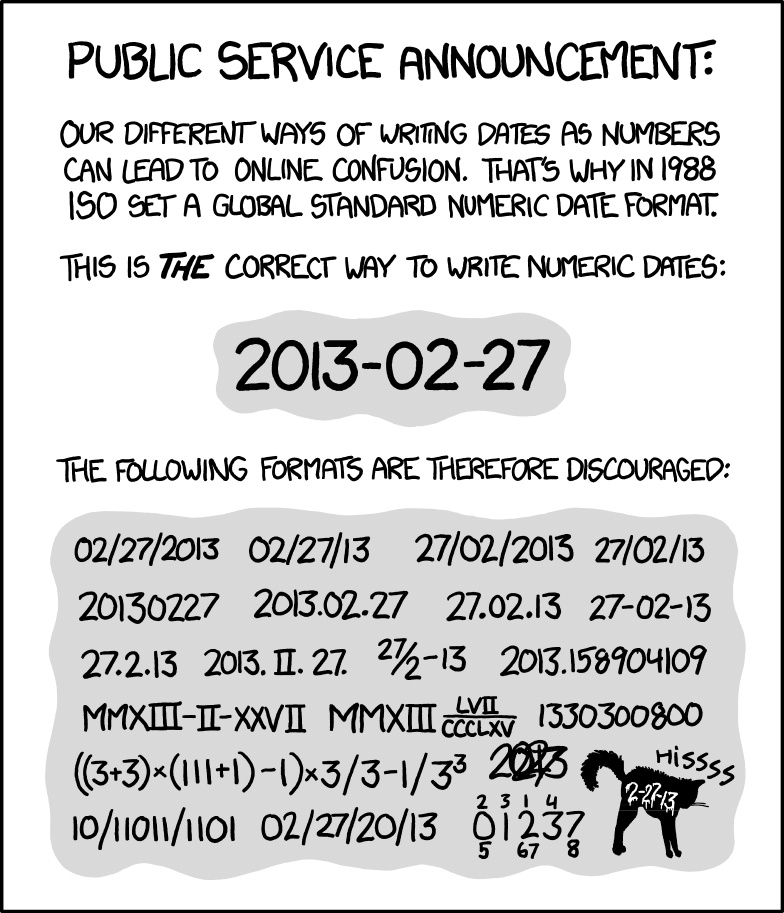I’m definitely in the “for almost everything” camp. It’s less ambiguous especially when you consider the DD/MM vs MM/DD nonsense between US dates vs elsewhere. Pretty much the only time I don’t use ISO-8601 is when I’m using non-numeric month names like when saying a date out loud.
Yeah, it’s pretty much everything for me too. The biggest exception being when UI is involved and a longhand date format would be more friendly.
Friendly to who?
The time reapers
In Canada we use MM/DD and DD/MM so you never quite know which it is! There’s an expense spreadsheet I fill out for work that uses one format in one place and the other format in another…
Holy cats, that sounds like a nightmare.
That would ruin my entire day
Hey, that sounds like my cloud storage providers auto billing system.
“Your auto renewal will draft on 08/09/23.”
Is that August 9th or September 8th? Literally depends on where the person you ask is in the world.
And you can do a simple sort on the combined number and youve sorted by date.

Can’t believe he missed the opportunity to add 41332 to the number of ways of how not to write dates.
I must be missing something.
Experience with excel.
I feel better that I don’t understand now.
Excel doesn’t display ISO dates unless you define a custom format.
Excel ::shudder::
They’re trying to make it look fake!
Everyone tries to make it look fake. Fuckers!
I recall writing a script that produces that 01237 with smaller digits around it for the current date. It lists the numbers that occur in the date (0, 2, 3 and 9 for 2023-09-09), the smaller digits show at which position they show up in a YYYYMMDD format (the 0 shows up on positions 2, 5 and 7)
The script has not been pushed online cause it was so dang bad
ISO-8601 over all other formats. 2023-08-09T21:11:00Z
Simple, sortable, intuitive.
Awful to actually read, though. Using T as a delimiter is mental… At least the hyphen provides some white space
Honestly, even a lowercase t.
deleted by creator
Why are you splitting and delimiting a date object? Convert it to a shallower object if that’s what you need
While you are definitely right, I and many others use yyyy-mm-dd outside of software. And that’s when the T becomes super lame.
Using T as a delimiter is mental
You get used to it.
Good luck using colons in a filename.
Linux has been able to handle that since the 90s.
Tough luck if you are using NTFS file system. All my homies use EXT4.
btrfs/zfs > ext4
I mean yes, but I haven’t used any of those yet, so I can’t fully agree.
Too long. Even 2023-08-09 is too long for me. But since I like the readability I use 2023.08.09. Less pixels and more readable then 20230809.
deleted by creator
My company has decided to standardized on phone numbers with dots instead of dashes. They’re in email signatures, memos, client proposals. I absolutely hate it and it rubs me the wrong way every time I see it. It’s wrong.
In Germany this is standardized, too. DIN 5008 for phone numbers. Areacode Number-extension. For example 0123 456789-01
deleted by creator
Same number of pixels, they are just different colours. But you still paid for them.
Although I actually like that format a lot, we use characters to help elicit context. 2023/08/09 is fine since we have been using / for dates for so long. Also it blows my mind why people don’t use : in 24 hour times. 16:40 is great, no am pm bullshit and you immediately know I’m talking time.
ISO 8601 is always the correct way to format dates.
ISO 8601 is the only correct way to format timestamps.
The intersection of iso8601 and rfc3339.
Christ, do this many people really find iso8601 hard to read? It’s the date and the time with a T in the middle.
It warms my heart to see so many comments in the camp of “I use it everywhere”. Absolutely same here. You are my people.
Together with hh:mm(:ss) for times and +hh:mm for timezones. Don’t make me deal with that 12am/pm bullshit that doesn’t make any sense, and don’t make make me look up just what the time difference is between CEST and IST. Just give me the offsets +02:00 and +05:30, and I can calculate that my local time of 06:55+03:30=10:25 in India.
You never know when something might need to become a filename, so you might as well just use ISO 8601 for everything.
Upvoted because I appreciate the exposure for this dating method, but I personally use it for everything. Much clearer for a lot of reasons IMO. Biggest to smallest pretty much always makes the most sense.
I do too, even in notes at work or handwritten stuff at home. I don’t always need to be reminded of the year first, but sometimes it becomes important on older stuff.
Plus when you’re in the US and work with people from Europe, the unambiguous ordering of month and day is a nice safeguard against silly misunderstandings.
…and if I don’t need the year, my eyes simply skip to the dash and continue to read from there.
ISO 8601 gang. You’d never want to describe dates that way but for file management the convenience is massive.
If you’re using a *NIX command line, something like
mkdir $(date +%F)_photosis super handy.
I do. Anything I have to put a datecode on, always gets a stamp of YYYYMMDD.
That’s not ISO8601
That is the basic format of ISO8601, hyphens are only used in the extended format which is encouraged to be used in plain text.
See ISO 8601:2004 section 2.3.3 basic format
deleted by creator
Nah man. Use 8601 for everything. They’re intrinsically chronologically sortable.
Or unix epoch time
In a programmatic context? Sure.
In an “I want to be able to comprehend this by glancing at it” context: absolutely not.
2023-08-10 15:45:33-04:00is WAY more human legible than1691696733.What, you don’t remember your time in Unix timestamps? Filthy casuls.
It’s super easy arithmetic too, just remember ”Pi seconds is a nanocentury.”
deleted by creator
Your prayer has been answered! Hear ye:
deleted by creator
deleted by creator
I really wonder how americans were able to fuck this one up. There are three ways to arrange these and two of them are acceptable!
Edit: Yes, I meant common ways, not combinatorically possible ways.
Hmmm more like 6 ways but I get your point
Three ways that people actually use. YYYY-MM-DD, DD-MM-YYYY, and MM-DD-YYYY (ew).
AFAIK no-one does YYYY-DD-MM, DD-YYYY-MM, or MM-YYYY-DD… yet. Don’t let the Americans know about these formats, they might just start using them out of spite.
YYYY-DD-MM, DD-YYYY-MM, or MM-YYYY-DD
What the actual fuck
‘hey man, what date is it today?’ ‘well it’s the 15th of 2023, August’
Lmao, I want to try responding like this and see what the reactions are
I want to try this, too. Make it more possessive, though. The 15th of 2023’s August. Really add to the confusion.
I’ll avoid those at all cost and go with the new standard of YY-MM-DD-YY. What’s the date today? 20-08-10-23
whoa, take it easy there Satan.
Need more julian dates, YYYY-JJJ.
What, 2023-223 for the 223rd day of the year 2023? That… is oddly appealing for telling the actual progress of the year or grouping. No silly “does this group have 31, 30, 29 or 28 members”, particularly the “is this year a multiple of four, but not of 100, unless it’s also a multiple of 400?” bit with leap days.
You’ll have oddities still, no matter which way you slice it, because our orbit is mathematically imperfect, but it’s a start.
So we need to correct our orbit is what I’m hearing!
That’d be a wack premise for a crazy scientist story
deleted by creator
Twelve ways if you count two-digit years. My nephew was born on 12/12/12 which was convenient.
for the americans, that’s 12/12/12
Thanks bro, I was really confused
My grandmother was born in 1896 and lived to be 102, just long enough for the pre-Y2K computer systems in hospitals to think she was a two-year-old.
Ouch!
I lost about an hour of my life trying to create a historical timeline in MS Excel. Eventually learned this is impossible with dates earlier than 1900.
this guy does combinatorics
It’s how the dates are typically said, here. November 6th, 2020 = 11/6/2020. [Edit: I had written 9 instead of 11 for November.] (We basically never say the sixth of November. It sounds positively ancient.) It’s easy to use, but I agree that YYYY-MM-DD is vastly superior for organization.
Where is here that November = 9? Probably somewhere you’ve had a long day
Oct = 8
Nov = 9
Dec = 10In metric time there are only 10 months per year
We basically never say the sixth of November. It sounds positively ancient.
When is your independence day, again?
Anyway, in Australia (and, I suspect, other places that use DD/MM/YYYY) we use “{ordinal} of {month}” (11th of August), “{ordinal} {month}” (11th August), and “{month} {ordinal}” (August 11th) pretty much interchangeably. In writing but not in speaking, we also sometimes use “{number} {month}” (11 August). That doesn’t have any bearing on how we write it short form though, because those are different things. It’s not the defence many Americans seem to think it is of their insane method of writing the short form.
When is your independence day, again?
July 4th, why?
So, not “the fourth of July” as everyone else calls it? https://en.wikipedia.org/wiki/Independence_Day_(United_States)
“Fourth of July” is the name of the holiday. It happens on “July 4th”.
“Independence Day” was a movie in the 90’s. We never say “Independence Day” around here unless the topic is Will Smith or REM.
It’s not the defence many Americans seem to think it is of their insane method of writing the short form.
I’ve never once been confused about a written date whilst in the US. Your country’s other-side-of-the-Earth flip-floppery on how it uses dates really doesn’t (and shouldn’t) impact our system, which we continue to use because it has proven effective and easy. Trying to stagnate an evolving culture/language is pointless and about as futile as trying to force a river to run backwards. If people start jumbling up how we do it here, like you say Australia does, then that will be right, too.
It is a bit of a chicken and egg question though. Because do Americans not say it that way because of the date format or is that the date format because you don’t say it that way?
Because in countries using DD.MM.YY we absolutely do say 6th of November.
That’s probably what happened. Though I do like starting with the larger context when talking about dates, but omitting it when talking about the current month or year.
Saying it like that is no problem and not ambiguous. Writing it like that makes no sense though.
I’m canadian and I’ve always prefered this format for the same reason. 11/6/23 is november 6th 2023, not the 11th of June 2023, that’s weird.
As a different Canadian, I always use YYYY-MM-DD and a 24 hour clock.
Except that mm/dd/yyyy and dd/mm/yyyy can be ambiguous, I definitely prefer the former if I’m not using an ISO date. But normally I just write ISO and my head translates to MMM dd,yyyy
deleted by creator
Do people outside of the US not say dates like “June first” etc? M/D/Y matches that. It’s really not weird at all, even if the international ambiguity is awful.
In Danish, it’s said like 1st of June.
Flemish here (aka dutch-speaking). We say first June, sixth November etc. English isn’t our native language, so M/D/Y is weird as fuck and completely illogical to us.
Yes it is objectively weird.
When you write down “07/01/1967” are you unaware that it is unclear whether you’re referring to July 1st or January 7th?
And despite the fact that you’re writing something down for the express purpose of communicating information, and you’re choosing to shorten it’s written format to save time and space, you’re ok with either
a) just leaving it ambiguous and communicating poorly
or
b) having to write extra words to give it context, taking up more space than just writing out “July 1st, 1967”?
1967/06/01 clearly communicates we’re starting with the year and going biggest to smallest time increments. There is no ambiguity as to which order it’s ever in, and it’s far shorter than the full written date.
At a fundamental user experience level, it is objectively nonsensical to choose the American date format when your goals are 1) clearly communicating a date and 2) doing it shorter than writing out the words.
I like to do YYDDMM because I’m a monster.
It’s not unclear to americans. “Objectively” is hilarious here. If it’s in the format people expect, then it’s perfectly fine in context. Sorry that US traditions don’t suit your fancy.
It’s definitely confusing in an international context, but well-estsblished conventions don’t change easily.
It’s not unclear to americans. “Objectively” is hilarious here. If it’s in the format people expect, then it’s perfectly fine in context. Sorry that US traditions don’t suit your fancy.
Yes, if you chose the objectively wrong way of doing something and then tell everyone that you’re always going to do it the wrong way, then yes, people will expect you to do it the dumb way. Congratulations. That’s how choosing a protocol works. That doesn’t mean that some protocols aren’t objectively worse than others.
It’s hilarious that you think “objective” is hilarious, given that you’re reasoning is based 100% on the subjective experiences of Americans.
That’s how formats work, I hate to break it to you. The ambiguity sucks, but the format itself makes perfect sense given the way americans say dates.
The ambiguity sucks, but the format itself makes perfect sense given the way americans say dates.
We all say dates the same.
It’s objectively dumb because it’s the format that results in ambiguity. Again, the point that it’s good cause Americans are familiar with it is a subjective criteria, since it only applies to American’s experience with using it, whereas the ambiguity of an out of order time span is an objective one.
Only the combination of formats results in ambiguity. Neither format is ambiguous on its own.
Standardization is good, and if someone were to change it should probably be the US given the apparent worldwide consensus otherwise. That doesn’t make either format good or bad on its own.
What I take issue with is people acting like the US format is some kind of bizarro nonsense when it in fact makes perfect sense in terms of matching spoken dates. That is hardly a weird basis for a format.
Each has its tradeoffs, and which set of tradeoffs is better is a subjective matter. I agree that d/m/y makes the most sense for an international standard (if not y/m/d), but to claim that the US format itself is somehow objectively bad is silly.
In Germany we say things like “we meet on the twelfth fifth” (Zwölfter Fünfter), which is the twelfth day of the fifth month. Often times the year is also shortened to only the last two digits, so it could be twelfth fifth twenty-four in dd-mm-yy format.
Of course we also use the names of the months, but sometimes we just number them.
Nah, for everything.
Typisk svensk!
.
There are two ways of writting dates: the “yyyy-mm-dd” one and the wrong one
ISO 8601 ftw. Here’s the date, time, and duration for our next meeting:
2023-08-10T20:00:00PT2H30M
But where is a timezone?
PT, Pacific time. /s
Timezone is optional, and when missing is read as local time.
In my mind, default is UTC unless otherwise specified.
luckily Local time can be any timezone!
nearly forgot that 8601 has support for durations as well
It handles ambiguity too. Want to say something lasts for a period of 1 month without needing to bother checking how many days are in the current and next month?
P1M. Done. Want to be more explicit and say 30 days?P30D. Want to say it in hours? Add theTseparator:PT720H.I used this kind of notation all the time when exporting logged historical data from SCADA systems into a file whose name I wanted to quickly communicate the start of a log and how long it ran:
20230701T0000-07--P30D..v101_pressure.csv(“
--” is the ISO-8601 (2004) recommended substitute for “/” in file names)If anyone is interested, I made this Bash script to give me
uptimebut expressed as an ISO 8601 time period.$ bkuptime P2DT4H22M4S/2023-08-15T02:01:00+0000, 2 users, load average: 1.71, 0.87, 0.68
better than the absolutely deranged MM/DD/YYYY and imo the best when it comes to international communication
I’ve been told " You don’t say 6th June, do you?" too many times
In the U.K. we do all the same. Sixth of June.
In the US it’s about 50/50 sixth of June and June sixth.
The amusing thing is that in Swedish you definitely do. Or actually “6:e juni”.
Germany too
Even Americans does as well: “4th of July”.
How the fuck does second largest to smallest to largest make any kind of sense?
YYYY-MM-DD for everything. My PC clock, my phone and even my handwritten notes all use that format.
The only other acceptable format is military notation: DD MMM YYYY.
That’s quirky - how is there anything logical about the military time format?
The 3 "M"s are not numerical, but indicate characters. For example 01 Jan 2023.
Considering how there’s almost no computers anymore with such limited resources that they can’t store a string or convert to one, it’s kind of crazy anybody bothers with the ambiguity of using numbers for the month.
The limited resource is not Compute Power, but Engineer time. Sure, you could ask someone to implement wrappers everywhere in the system so that the display is human-readable - or you could put one label somewhere clarifying the date format to readers.
Implement wrappers everywhere? Why can’t they just write a single function that takes an ISO date a spits out a string (human readable) date? I’d put money down that such a function already exists in almost every library that deals with dates.
That’s why I said “implement” and not just “write”. The process of wiring in that existing function has non-negligible cost, as does keeping it updated/patched.
Sure, it should be pretty small - but it’s non-zero. Is it worth it? That’s a product decision.
Hmm good point actually
Yes spreadsheet apps like excel do this. If I remember correctly MMMM would write the full month. January.
i just write mmmmmmm because you can never have too many m’s.
It’s written like 07 Aug 2013. It’s consistent in character length, doesn’t confuse internationals, doesn’t take much space and is written exactly like being said around here. It’s just not that great for file names.
Yeah, ok. Expanding the month to 3 chars does reduce potential confusion
I feel the need to be pedantic and point out that this is only necessary, however because of the ridiculous degenerate convention of MM DD YY(YY?) used by said country…






























